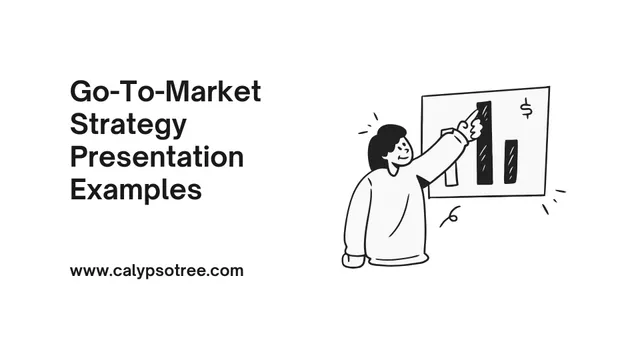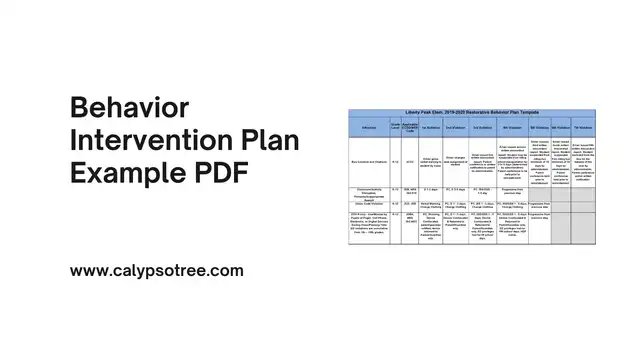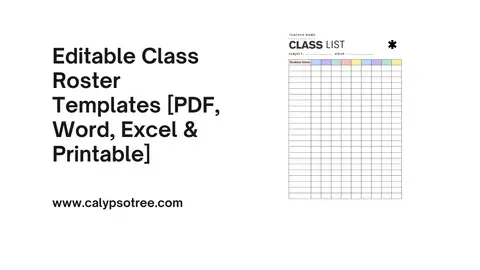Personal Statement on Resume Example: A personal statement on a resume is a summary that showcases your professional goals, skills, and experiences. It’s the first thing a potential employer reads, so it needs to grab their attention quickly!
This article will explain about personal statement on a resume, why it’s important, key components, examples, how to write, and common mistakes to avoid
Why a Personal Statement Matters
Imagine you’re in a room full of people, all waiting for a chance to speak. That’s where a Personal Statement on your resume comes in!
First Impressions Count!
The first few moments are crucial when making new friends or impressing someone. The same goes for job applications. Your statement is like a quick handshake with your potential boss. It’s the first thing they read, so it needs to make a big impact!
It’s Your “Elevator Pitch”
Ever heard of an “elevator pitch”? Imagine you’re in an elevator with a top boss of a big company. You’ve only got a few floors to impress them. What would you say? Your statement is like that. It’s a short and catchy way of saying, “Hey, this is who I am, and this is what I can do!”
Show Your Unique Spark
Each of us is special in our way. You may be great with numbers or have a way with words.
It Guides the Reader
Think of your statement as a map or a signpost. It points the reader in the right direction. It tells them what they can expect to find in the rest of your resume.
Sets the Tone
Your statement also sets the mood. Are you serious? Fun? Creative? This little statement can tell the reader a lot about your personality and attitude.
Key Components of a Personal Statement
Creating a personal statement is like building a small model of yourself using words. There are certain pieces or components you need to include. Let’s break them down!
Introduction to Who You Are
At the very start, you want to tell the reader about yourself. No need for a long story. A brief introduction. For example, “A passionate software developer with over five years of experience.”
Your Career Objective
What’s your big goal in your job or career? It is where you share it. For instance, “Eager to use my coding skills to create software that makes a difference in the world.”
Your Key Skills
Think of this as your tool belt. What tools or skills do you have that make you great at what you do? It could be things like “expert in Python” or “pro at graphic design.”
What You Bring to the Role
Every job is like a puzzle. And you’re one of the pieces! In this part, you tell the reader how you fit into that puzzle.
A Personal Touch
While most of the personal statement is about your job skills, you also want to give a tiny peek into who you are outside of work. Maybe you love hiking, or you’re a chess champion. A fun fact can make you more memorable!
Brevity is Key
Remember, a personal statement isn’t a novel. It’s more like a quick picture. So keep it short and sweet. Usually, 2-4 sentences are enough to get the job done.
Clear and Simple Language
You want everyone to understand your statement, no matter who they are. So, use simple words and clear sentences. No need for big, fancy words here.
Tailor to the Role
It is a super important piece. Every job is different. Every personal statement should be different, too. Always make sure your statement fits the job you’re applying for.
How to Write a Personal Statement
With the right steps, you can create a statement that shines. Here’s a guide to help you craft the perfect one:
Start with Reflection
Before you write anything, spend some time thinking about yourself. What are your strengths? What are your goals? What makes you unique? Jot down these thoughts. They’ll be super helpful when you start writing.
Understand the Job or Role
Read the job posting or role description carefully. What is the employer looking for? What skills or qualities are important? Make a list, and keep it close by. You’ll want to make sure your statement speaks to these points.
Write a Strong Opening Line
Your first line should grab attention. It could be a statement about your passion, career goal, or a proud achievement. For example, “Transforming ideas into impactful digital designs is my driving passion.”
Highlight Key Skills and Experiences
Choose 2-3 key skills or experiences that make you a great fit for the job. Be specific. Instead of saying, “I’m a good leader,” you could say, “Led a team of 5 in a successful project launch.”
Show Your Personality
Employers want more than just skills. They want people! So, add a touch of your personality. Talk about what drives you or what you’re passionate about outside of work.
Stay Positive and Forward-Looking
Keep the tone of your statement upbeat. Focus on what you can contribute and how you see your future in the role.
Keep It Short and Sweet
A personal statement should be concise. Aim for a few strong sentences, not a long essay.
Proofread, Proofread, Proofread!
Always check your statement for mistakes. A tiny spelling error or grammar mistake can be distracting. You want the focus to be on your message, not on mistakes.
Ask for Feedback
Share your statement with a friend, family member, or mentor. They might offer valuable feedback or see things from a different angle.
Customize for Each Application
Remember, every job or role is unique. So, tweak your statement a bit for each one. It shows you’ve done your homework and that you care.
Common Mistakes in Personal Statements and How to Avoid Them
Crafting a personal statement can be challenging, and sometimes, mistakes can sneak in. Here’s a look at some common pitfalls and tips to sidestep them:
Being Too Generic
Mistake: Using clichés and broad statements like “I’m a hard worker” or “I’m a team player” without providing specifics.
How to Avoid: Give details and examples. Instead of saying you’re a team player, mention a time when you collaborated on a successful project or helped resolve a team conflict.
Making It All About You
Mistake: Only discuss what you want from the job or what it can do for you.
How to Avoid: While it’s called a ‘personal’ statement, remember to focus on what you can offer the company or employer. Showcase how your skills and experiences align with their needs.
Ignoring the Job Description
Mistake: Writing a one-size-fits-all statement that needs to address the job’s specifics.
How to Avoid: Tailor your statement to each job you apply for. Highlight skills and experiences that match the job description.
Being Negative
Mistake: Discussing past failures, conflicts, or pointing fingers at previous employers.
How to Avoid: Stay positive. Discussing challenges, focus on what you learned or how you grew from the experience.
Writing Too Much
Mistake: Make your statement shorter.
How to Avoid: Keep it concise. Desire for transparency and brevity, focusing on the most appropriate and impressive details.
Using Complex Language
Mistake: Using big words or jargon in an attempt to sound smart.
How to Avoid: Keep the language simple. Your goal is to be understood by whoever reads your statement.
Not Proofreading
Mistake: Submitting a personal statement with typos, grammatical errors, or inconsistencies.
How to Avoid: Always proofread your statement multiple times. Consider using spell-check tools or asking someone else to review it for you.
Being Dishonest
Mistake: Exaggerating achievements or claiming skills you need to possess.
How to Avoid: Be genuine and honest about your experiences and skills. Remember, the truth has a way of surfacing, especially during interviews.
Using a One-Size-Fits-All Approach
Mistake: Use the same statement for every job application without any customization.
How to Avoid: Personalize your statement for each role. Show the employer that you’ve done your research and that you’re genuinely interested.
Forgetting Your Audience
Mistake: Not considering who will read your statement and what they want.
How to Avoid: Put yourself in the employer’s shoes. Think about what they want in a candidate and craft your statement accordingly.
Personal Statement on Resume Examples
Personal statements can vary depending on the industry, position, and individual’s experience. However, they should always be tailored to reflect your unique skills and experiences. Here are some examples across different scenarios:
Recent Graduate in Business
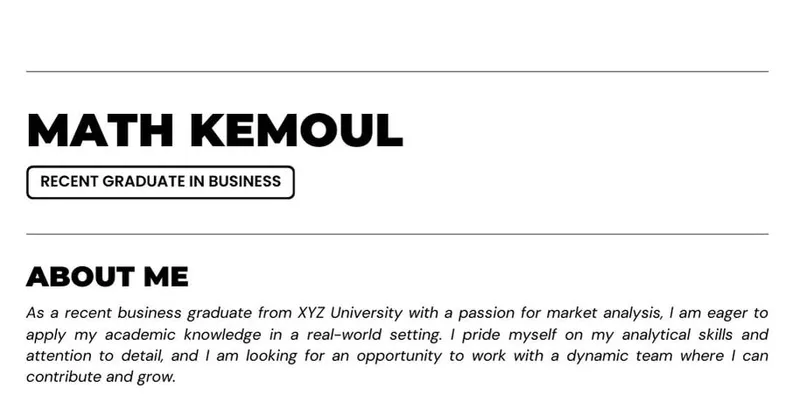
“As a recent business graduate from XYZ University with a passion for market analysis, I am eager to apply my academic knowledge in a real-world setting. I pride myself on my analytical skills and attention to detail, and I am looking for an opportunity to work with a dynamic team where I can contribute and grow.”
Career Switcher to Healthcare
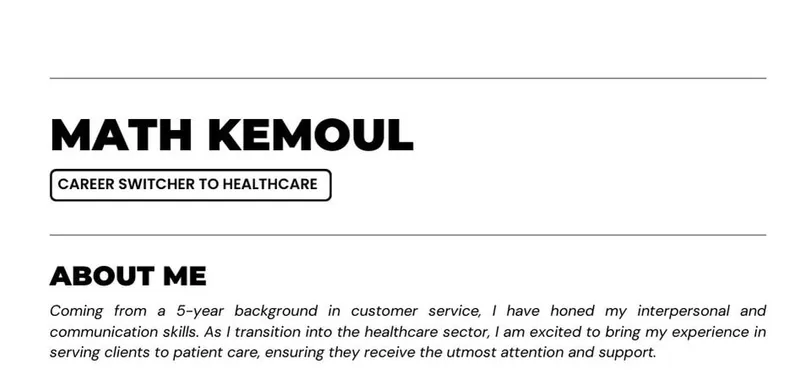
“Coming from a 5-year background in customer service, I have honed my interpersonal and communication skills. As I transition into the healthcare sector, I am excited to bring my experience in serving clients to patient care, ensuring they receive the utmost attention and support.”
Software Developer with Experience
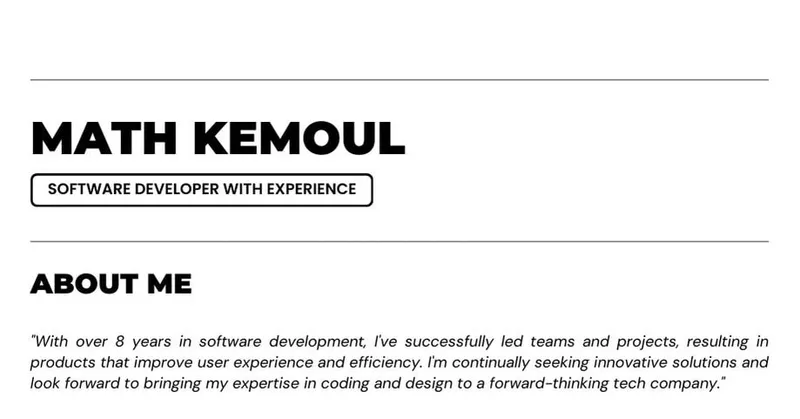
“With over 8 years in software development, I’ve successfully led teams and projects, resulting in products that improve user experience and efficiency. I’m continually seeking innovative solutions and look forward to bringing my expertise in coding and design to a forward-thinking tech company.”
Teacher Seeking Administrative Role
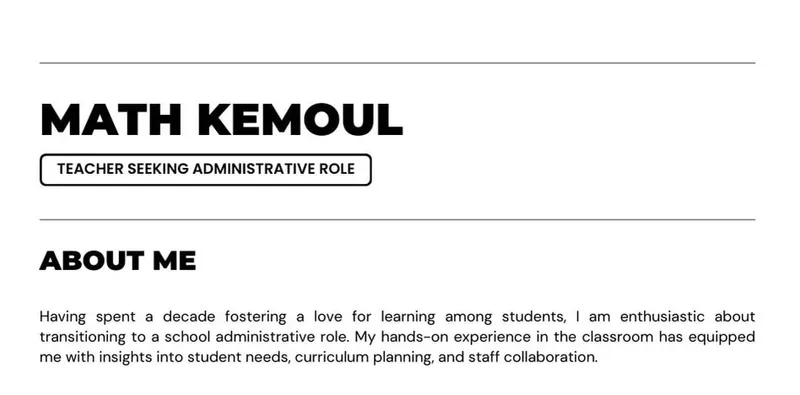
“Having spent a decade fostering a love for learning among students, I am enthusiastic about transitioning to a school administrative role. My hands-on experience in the classroom has equipped me with insights into student needs, curriculum planning, and staff collaboration.”
Entry-Level Sales Position
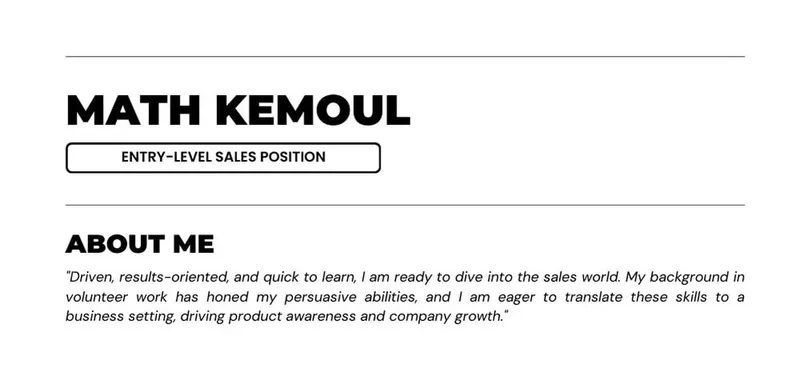
“Driven, results-oriented, and quick to learn, I am ready to dive into the sales world. My background in volunteer work has honed my persuasive abilities, and I am eager to translate these skills to a business setting, driving product awareness and company growth.”
Environmental Science Graduate
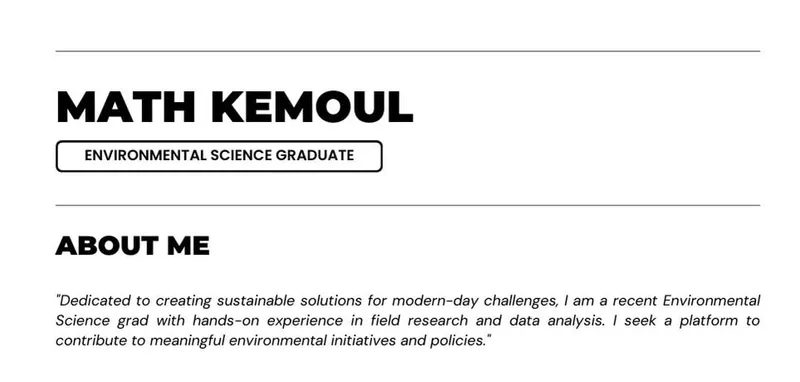
“Dedicated to creating sustainable solutions for modern-day challenges, I am a recent Environmental Science grad with hands-on experience in field research and data analysis. I seek a platform to contribute to meaningful environmental initiatives and policies.”
Aspiring Data Scientist
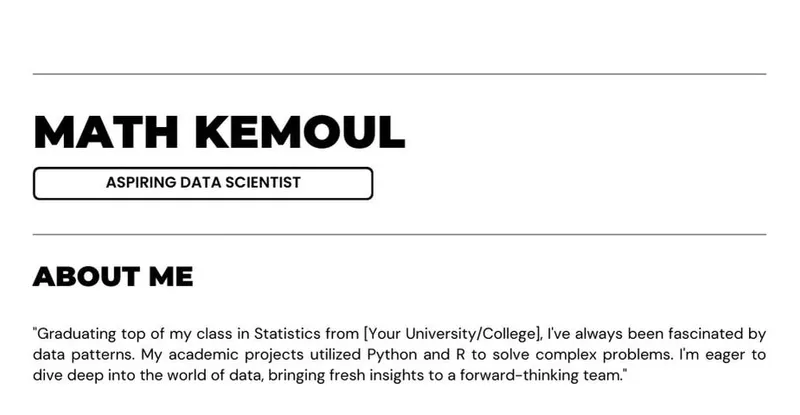
“Graduating top of my class in Statistics from [Your University/College], I’ve always been fascinated by data patterns. My academic projects utilized Python and R to solve complex problems. I’m eager to dive deep into the world of data, bringing fresh insights to a forward-thinking team.”
Environmental Advocate
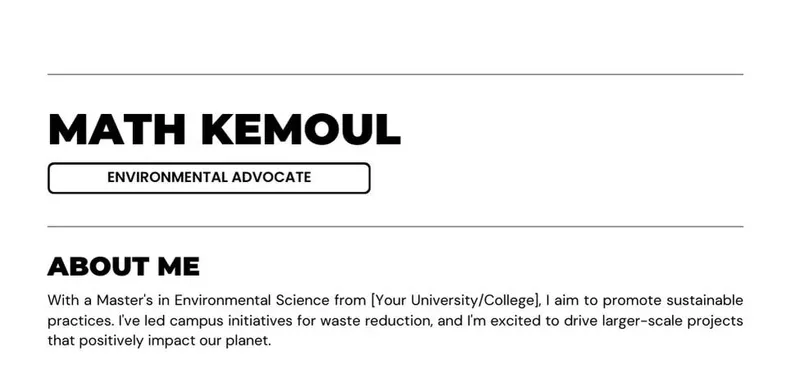
“With a Master’s in Environmental Science from [Your University/College], I aim to promote sustainable practices. I’ve led campus initiatives for waste reduction, and I’m excited to drive larger-scale projects that positively impact our planet.”
Financial Analyst Hopeful
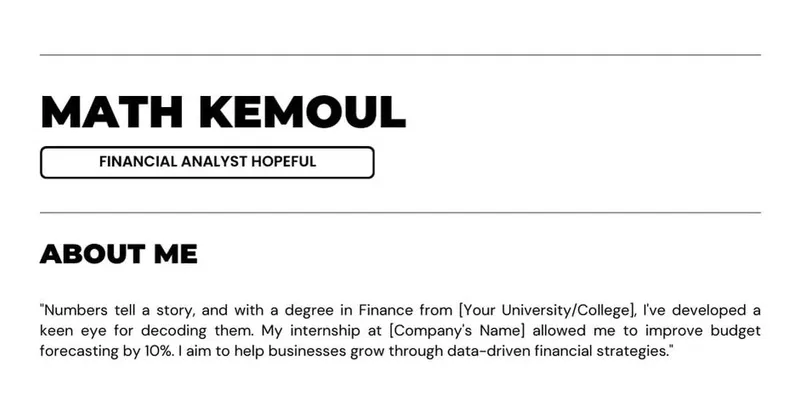
“Numbers tell a story, and with a degree in Finance from [Your University/College], I’ve developed a keen eye for decoding them. My internship at [Company’s Name] allowed me to improve budget forecasting by 10%. I aim to help businesses grow through data-driven financial strategies.”
Upcoming Social Media Influencer
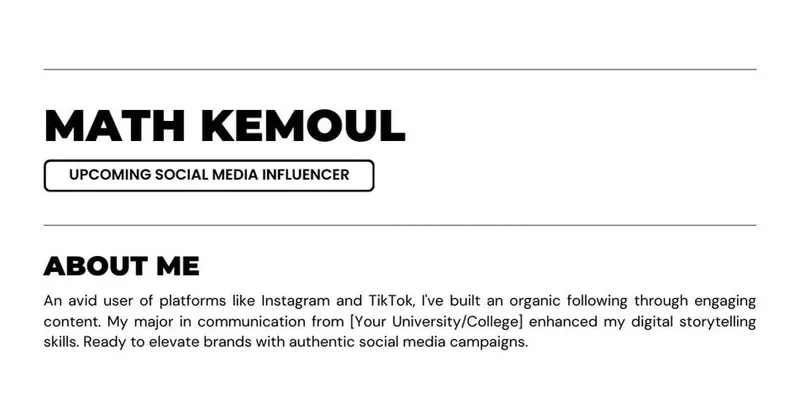
“An avid user of platforms like Instagram and TikTok, I’ve built an organic following through engaging content. My major in communication from [Your University/College] enhanced my digital storytelling skills. Ready to elevate brands with authentic social media campaigns.”
Novice Civil Engineer
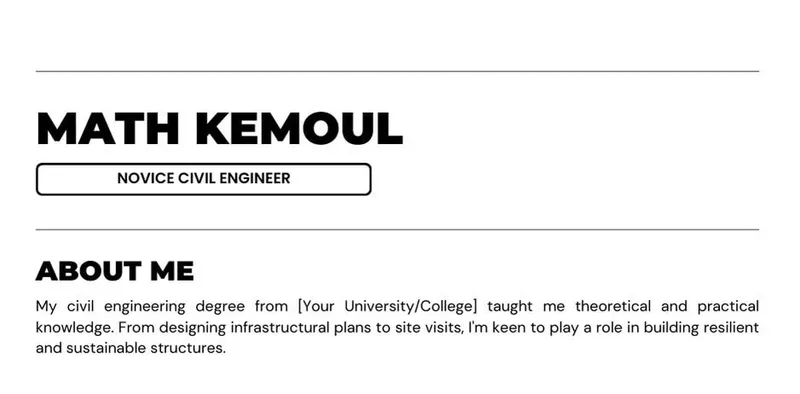
“My civil engineering degree from [Your University/College] taught me theoretical and practical knowledge. From designing infrastructural plans to site visits, I’m keen to play a role in building resilient and sustainable structures.”
Nutritionist with a Purpose
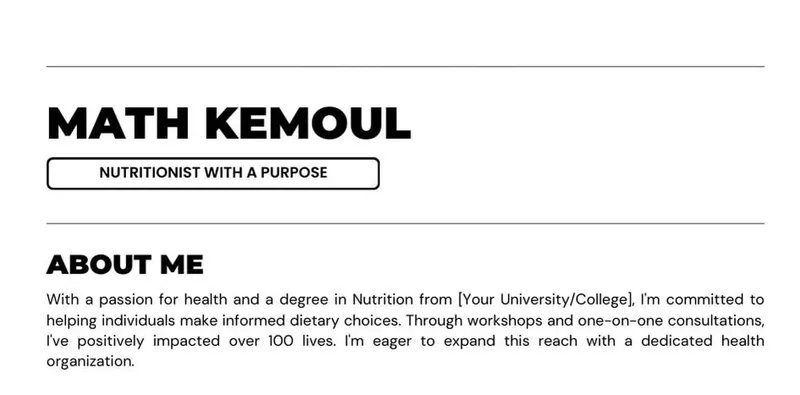
“With a passion for health and a degree in Nutrition from [Your University/College], I’m committed to helping individuals make informed dietary choices. Through workshops and one-on-one consultations, I’ve positively impacted over 100 lives. I’m eager to expand this reach with a dedicated health organization.”
Blossoming Event Planner
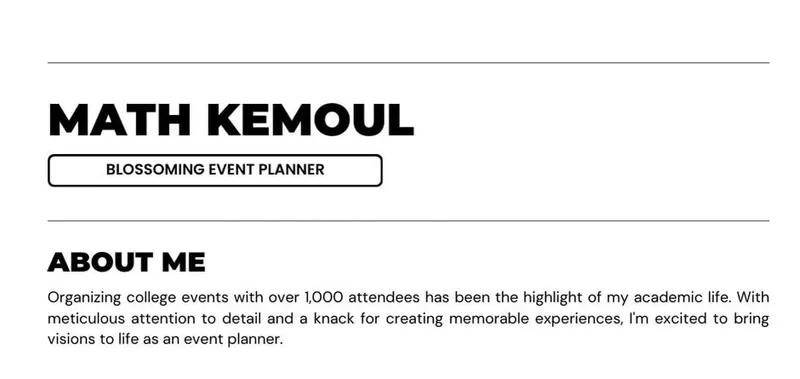
“Organizing college events with over 1,000 attendees has been the highlight of my academic life. With meticulous attention to detail and a knack for creating memorable experiences, I’m excited to bring visions to life as an event planner.”
Future Real Estate Mogul
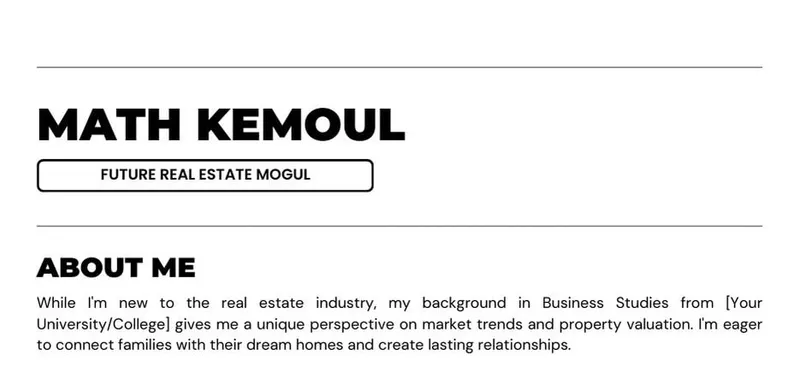
“While I’m new to the real estate industry, my background in Business Studies from [Your University/College] gives me a unique perspective on market trends and property valuation. I’m eager to connect families with their dream homes and create lasting relationships.”
Blossoming Sales Executive
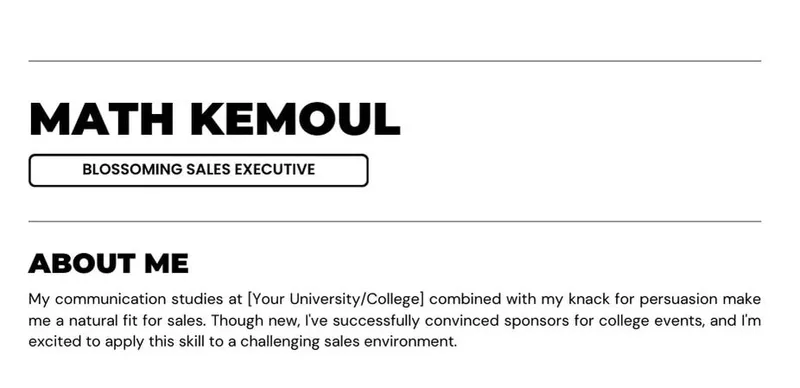
“My communication studies at [Your University/College] combined with my knack for persuasion make me a natural fit for sales. Though new, I’ve successfully convinced sponsors for college events, and I’m excited to apply this skill to a challenging sales environment.”
Aspiring Academic Counselor
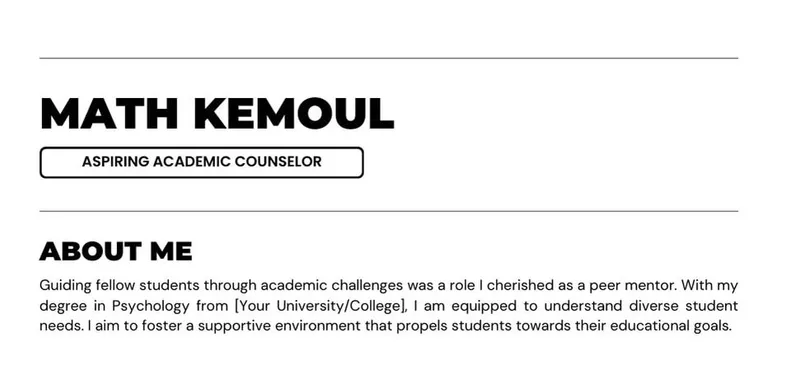
“Guiding fellow students through academic challenges was a role I cherished as a peer mentor. With my degree in Psychology from [Your University/College], I am equipped to understand diverse student needs. I aim to foster a supportive environment that propels students towards their educational goals.”
Digital Marketing Enthusiast
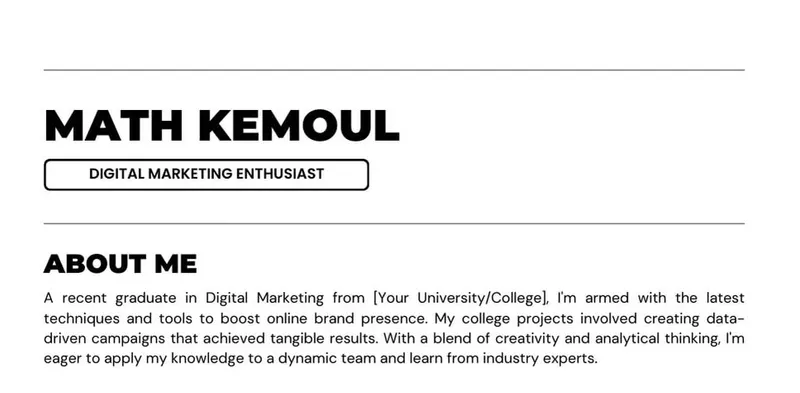
“A recent graduate in Digital Marketing from [Your University/College], I’m armed with the latest techniques and tools to boost online brand presence. My college projects involved creating data-driven campaigns that achieved tangible results. With a blend of creativity and analytical thinking, I’m eager to apply my knowledge to a dynamic team and learn from industry experts.”
Human Resources Novice
“Having completed an internship with [Company’s Name], I have witnessed the transformative power of effective human resources practices. I am a people person who strongly believes in promoting company culture and values. My interpersonal skills and a foundation in HR principles prepare me to contribute positively to an organization’s talent management goals.”
Software Developer in the Making
“While still in the learning phase of my journey as a software developer, my passion for coding has led me to develop small applications and participate in hackathons. Skilled in [Specific Programming Languages], I am eager to join an environment that will challenge my abilities and provide growth opportunities.”
Upcoming Journalist
“With a Bachelor’s in Journalism from [Your University/College], I have honed my writing and reporting skills through both academic assignments and freelance projects. I have a curious nature, a knack for storytelling, and a commitment to producing unbiased and accurate news. Looking for a platform where I can grow and contribute to quality journalism.”
Graphic Designer with a Flair
“Design is a language, and I’ve learned to speak it fluently during my diploma course in Graphic Designing at [Institute’s Name]. From creating mock-ups to understanding the color psychology behind brands, my portfolio showcases a range of styles. I’m excited to bring my artistic touch to a team that values innovation and creativity.”
These statements give a snapshot of each candidate, touching upon their educational background, relevant experiences, and specific skills. Tailoring your statement to your industry and job role is crucial to making an impactful first impression.
Tips for Refining Your Statement
Once you’ve written your initial draft, refining it is crucial to make it shine. Here are some pointers to help you fine-tune your statement:
Read Aloud
- Why? It’s easier to catch awkward phrasing or mistakes when you hear them.
- Tip: Listen to the flow and rhythm. If you stumble over a section, it might need revising.
Get Feedback
- Why? Fresh eyes can spot errors you might have overlooked.
- Tip: Review your statement with trusted friends, mentors, or colleagues. They might offer valuable insights or suggestions.
Cut Out Fluff
- Why? Conciseness is key. Long-winded statements can lose the reader’s interest.
- Tip: Eliminate any words that don’t add value. Focus on clear, concise points.
Stay Authentic
- Why? Authenticity resonates. Employers can tell when you’re being insincere.
- Tip: Stick to real experiences and genuine feelings. Refrain from writing what you think employers want to hear.
Use Strong Action Verbs
- Why? They make your statement dynamic and impactful.
- Tip: Instead of saying, “I was involved in a project,” say, “I spearheaded a successful project.”
Avoid Repetition
- Why? Repeating points or skills can make it seem like you need more experience.
- Tip: Ensure each sentence offers new information or a unique insight.
Align with the Job Role
- Why? Tailoring your statement to the specific role shows effort and genuine interest.
- Tip: Highlight skills or experiences that directly relate to the job description.
Check for Consistency
- Why? Inconsistencies can confuse the reader or make you seem careless.
- Tip: Ensure your statement aligns with other parts of your resume or application.
Keep it Positive
- Why? Positivity leaves a good impression and shows resilience.
- Tip: Focus on achievements, growth, and what you bring to the table rather than past challenges or conflicts.
Final Proofread
- Why? Errors can detract from your statement’s quality and professionalism.
- Tip: Proofread multiple times. Consider using digital tools to help catch mistakes.
FAQs
How long should my statement be?
It should be concise, typically around 2-4 sentences or 50-200 words. It’s a snapshot, not a biography!
Is a personal statement the same as a cover letter?
No, they’re different. It is a summary of your resume, while a cover letter is a separate document that details why you’re the best fit for the job.
I’m a fresher. What should I include in my statement?
Even if you’re starting, focus on your education, any relevant activities or clubs you were part of, and the soft skills (like teamwork or problem-solving) that you possess.
Can I use the same personal statement for every job application?
Tailoring to each job you apply for is best. It shows employers that you’ve done your homework and are genuinely interested in the role.
What should I avoid in my statement?
Avoid being too vague or using buzzwords without backing them up with examples. It’s also a good idea to steer clear of negative language or mention personal details like age or marital status.
How formal should my statement be?
While it should be professional, it’s also your chance to showcase your personality. Ensure it aligns with the company’s culture you’re applying to.
Conclusion
Crafting a powerful personal statement is not just an option; it’s a necessity. Remember, this is your first impression. Make it count.
So, there you have it—a comprehensive guide to writing a personal statement that could make all the difference in your next job application. Take your time, tailor it, and make it great. Your future could depend on it.

The content creator team at calipsotree.com is dedicated to making topics accessible to everyone, with over 9 years of experience in writing and breaking down complex concepts into easy-to-understand articles that answer readers’ financial questions.






